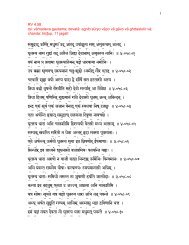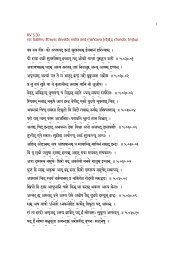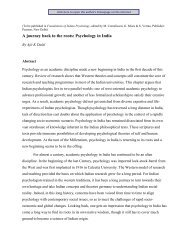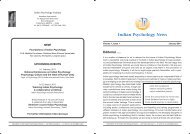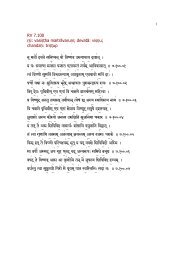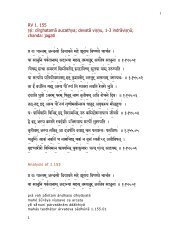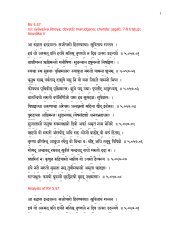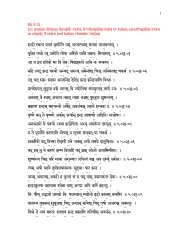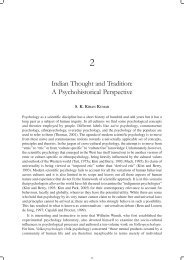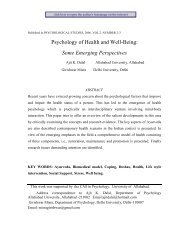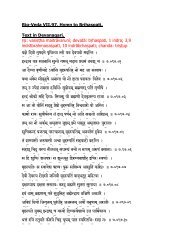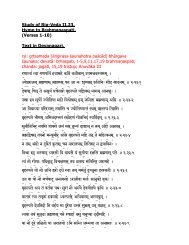core and Context -Fi.. - Indian Psychology Institute
core and Context -Fi.. - Indian Psychology Institute
core and Context -Fi.. - Indian Psychology Institute
You also want an ePaper? Increase the reach of your titles
YUMPU automatically turns print PDFs into web optimized ePapers that Google loves.
It may be noted that the growth of scientific psychology has resulted in losing the<br />
essential constituents, such as psyche <strong>and</strong> consciousness, <strong>and</strong> making the enterprise an<br />
empirical discipline, which is composed of things borrowed from various disciplines <strong>and</strong><br />
nothing of its own. As such psychology is so disintegrated <strong>and</strong> fragmented that a meaningful<br />
definition of the discipline is next to impossible. Today psychology is experiencing<br />
fragmentation <strong>and</strong> its diverse applications make it contingent on variable contexts (Misra &<br />
Kumar, in press). The illusion of developing gr<strong>and</strong> empirically derived theories <strong>and</strong><br />
principles of human behaviour <strong>and</strong> action could not sustain for long. One finds distinct<br />
changes in the academic scenario in the field of psychology that have created avenues for an<br />
engagement with culture. The emergence of cross-cultural, ethno, indigenous <strong>and</strong> cultural<br />
psychological approaches brought into focus the significance of culture in underst<strong>and</strong>ing<br />
psychological processes. Also, the supremacy of physical science as the prototype of inquiry<br />
into human affairs has been questioned by the philosophers of science (e.g., Derrida, 1982;<br />
Foucault, 1980; Gergen, 1989). This has led to revision of the nature of underst<strong>and</strong>ing of<br />
science <strong>and</strong> scientific enterprise. A related development has been the increasing use of<br />
qualitative methods which rely on subjectivity, human experience <strong>and</strong> a constructivist<br />
approach to human underst<strong>and</strong>ing. These developments facilitated the emergence of a<br />
critical look at the disciplinary affairs <strong>and</strong> various possibilities have emerged.<br />
The realizations within the community of psychologists in India emanating from<br />
self-reflection <strong>and</strong> growing discomfort with the limitations of academic engagements within<br />
the received paradigm, at conceptual as well as societal planes, led to nationwide reflection<br />
<strong>and</strong> debate among <strong>Indian</strong> psychologists. The result was a distinct clamor to indigenize the<br />
prevailing Euro - American discipline <strong>and</strong> to make it culturally sensitive. D. Sinha (1965)<br />
gave a call for integration of modern psychology with <strong>Indian</strong> thought. Many significant<br />
works involving critique <strong>and</strong> reconstruction have come out in the following decades. Sinha‟s<br />
writings (1981, 1986, 1997, <strong>and</strong> 1998) persistently endeavored to make the point that<br />
psychology has to be culturally relevant <strong>and</strong> called for indigenization of the discipline. A<br />
large number of publications have come out during this period critically reviewing the state<br />
of psychology in India <strong>and</strong> urging the colleagues to make it socially relevant <strong>and</strong> compatible<br />
with the <strong>Indian</strong> ethos (Dalal, 1996; Gergen, Gulerce, Lock, & Misra, 1996; Misra, Prakash,<br />
& Verma, 1999; Misra & Gergen, 1993; Misra & Mohanty, 2002; P<strong>and</strong>ey, 2001, 2004;<br />
Sinha, 2000). Amidst much confusion <strong>and</strong> lack of self-confidence the move to articulate <strong>and</strong><br />
nurture psychology with <strong>Indian</strong> concepts <strong>and</strong> theories took considerable time in gathering<br />
momentum. However, these efforts to rejuvenate psychology in the ancient texts intensified<br />
in the eighties <strong>and</strong> nineties. Some notable publications of this period are by Paranjpe (1984,<br />
1998), Chakraborty (1995), Saraswathi (1999) <strong>and</strong> Rao (1988; 2002, 2005). This stream has<br />
built not only on the interpretation of traditional concepts <strong>and</strong> theories in contemporary<br />
idiom, but also on their integration within a broader, global perspective. A comprehensive<br />
approach to IP involves issues of justice <strong>and</strong> dana (Krishnan, 2005), poverty (Misra &<br />
Tripathi, 2004), interpersonal relationship (Kakar, 2007), organizational development<br />
(Singh-Sengupta, 2007), creativity (Bhawuk, 2003), concept of self ( Bhawuk, 2005), pain<br />
<strong>and</strong> suffering (An<strong>and</strong>, 2004, 2006), emotions <strong>and</strong> affect (Bhawuk, 2008a; Jain, 2004;<br />
Misra, 2004, 2005, Paranjpe,2009; Singh & Misra, 2005), religious behaviour <strong>and</strong> devotion<br />
(Paranjpe, 2007), <strong>and</strong> peace <strong>and</strong> well being (Bhawuk, 1999; Dalal, & Misra, 2005; Kiran<br />
Kumar, 2004; Misra & Srivastava, 2004), to name just a few.<br />
In more recent times, efforts to build <strong>Indian</strong> psychology as a vibrant discipline have<br />
intensified. Several conferences (Puducherry, 2001, 2002, 2004; Kollam, 2001; Delhi, 2002,<br />
2003, 2007; Vishakhapatnam, 2002, 2003, 2006; Bengaluru, 2007) have given impetus to<br />
this movement of IP. The publication of the Journal of <strong>Indian</strong> psychology since 1976 ,<br />
4



